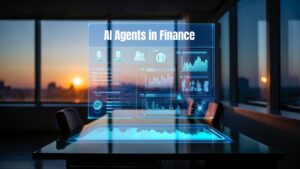The finance sector is undergoing a once-in-a-generation transformation, and AI is the spark that’s igniting it.
From Wall Street powerhouses and global insurers to lean fintech disruptors, financial institutions are embracing artificial intelligence to enhance decision-making, accelerate core operations, and build systems that aren’t just faster, but smarter and more adaptable. What was once speculative is now proven. AI isn’t on the sidelines—it’s driving the playbook.
According to the Cambridge Centre of Alternative Finance, 85% of financial services providers are already using AI in some capacity, and nearly 50% view it as a potential competitive threat. This isn’t about following a trend—it’s about delivering outcomes. AI is now the invisible infrastructure powering fraud detection in milliseconds, hyper-personalized client recommendations, lightning-fast claims processing, and real-time market insights.
This guide is your executive primer on how AI is reshaping finance and what your institution needs to know to stay ahead. Here we’ll break down:
- What AI in finance actually means
- Where it’s being used right now
- Tangible benefits being realized
- 7 use cases in finance that are driving the biggest wins
- What the future holds for AI in financial services
Let’s explore how the most forward-thinking financial leaders are deploying AI to outpace their competition.
What is AI in Finance?
Let’s first define AI in financial services. AI in this sector typically refers to the use of advanced algorithms, data modeling, and machine learning techniques to automate processes, improve decision-making accuracy, personalize customer engagement, and optimize complex workflows within financial institutions.
Where legacy systems followed strict logic trees and rigid manual operations, AI introduces a dynamic layer of intelligence—software that learns from data, evolves in real time, and continuously improves performance without human intervention. This transition isn’t just technical—it’s strategic. AI empowers financial institutions to move from reactive to predictive, from static to adaptive, from volume to velocity.
Here are some of the foundational technologies powering AI in finance:
- Machine Learning (ML): Analyzes vast historical datasets to detect trends, build models, and make predictions.
- Natural Language Processing (NLP): Enables computers to understand and generate human language, making it ideal for automating customer service, processing unstructured text data, and analyzing sentiment.
- Predictive Analytics: Uses historical and real-time data to forecast events such as market shifts, defaults, or customer attrition.
- Robotic Process Automation (RPA): Automates rules-based tasks like form filling, document handling, and compliance checks.
Together, these technologies form the backbone of modern intelligent finance. They not only streamline operations but also open up entirely new possibilities for how financial firms understand risk, engage customers, and generate value.
How AI Is Used in Financial Services
In the financial services industry, AI is being integrated into a wide spectrum of functions, each aimed at solving a unique set of challenges and unlocking tangible business value. From improving credit decisions to transforming trading strategies, AI is redefining how finance gets done.
Related Read: AI Financial Services Case Studies
Here’s a deeper look at where AI is actively delivering results across financial services:
Risk Assessment & Credit Scoring
Traditional risk models can miss the mark by relying on outdated or narrow datasets. AI changes the game by analyzing vast streams of real-time data—from spending habits and income flows to device usage and behavioral signals. This allows institutions to assess an individual’s financial risk with far greater precision, enabling proactive decision-making and more tailored financial products.
Instead of basing creditworthiness on a static score, AI-powered credit models incorporate alternative data like utility payments, mobile activity, geolocation trends, and even online behavior. These systems uncover patterns traditional scoring misses, helping lenders identify trustworthy borrowers in thin-file or no-file segments—expanding access to credit while keeping default risk in check.
Related Read: Ai in Due Diligence
Trading and Investment Strategy Automation
AI is revolutionizing how portfolios are built, managed, and optimized. Sophisticated algorithms analyze vast market datasets, news sentiment, economic indicators, and even social media chatter to inform trading decisions. High-frequency trading systems react to market fluctuations in milliseconds, while robo-advisors use similar technology to guide retail investors toward tailored strategies with precision.
Regulatory Compliance & Reporting
In an industry governed by intense scrutiny, compliance is critical—but managing it manually is slow, expensive, and error-prone. AI simplifies this by automatically monitoring transactions for red flags, auditing data trails in real time, and identifying compliance breaches before they become liabilities. It continuously learns from past enforcement actions and regulatory changes, helping institutions stay ahead of evolving rules without drowning in complexity.
AI also transforms how reports are generated and delivered. Instead of combing through spreadsheets and legal jargon, NLP-based systems scan and interpret thousands of pages of legislation in seconds, pulling out relevant data points and formatting them into audit-ready documentation. This not only saves compliance teams hundreds of hours but ensures accuracy, consistency, and readiness for regulators—at the push of a button.
Personalized Financial Planning
AI enables a shift from generalized financial advice to hyper-personalized guidance. Digital platforms can now interpret a user’s income, spending habits, goals, and risk tolerance to craft bespoke plans. Whether it’s automating retirement savings adjustments, sending budget alerts, or recommending investment rebalancing, AI ensures every action aligns with a client’s unique financial narrative.
Related Read: AI in Financial Planning
Loan Underwriting & Fraud Monitoring
AI enhances the underwriting process by instantly verifying income, assets, and employment through cross-referenced databases. It speeds up approvals by analyzing creditworthiness using alternative data points—like payment histories, bank activity, and spending behavior. Document scanning, identity validation, and real-time analytics replace time-consuming manual steps, allowing lenders to issue decisions in minutes, not days.
At the same time, AI-powered fraud detection engines monitor millions of transactions in real-time, constantly learning user behavior patterns. When something feels off—like an unusual purchase location, device change, or login attempt—it flags the transaction within milliseconds. These systems adapt to new fraud tactics, stopping threats before they spread and reducing false positives that frustrate legitimate customers.
These applications showcase why AI isn’t just a value-add—it’s fast becoming an operational requirement. And as these technologies evolve, they promise to deliver even greater efficiency, security, and innovation across the financial services landscape.
Benefits of AI in Finance
Why are financial firms moving fast to embed AI into their operations? Because the ROI is clear—and climbing. From operational efficiency to customer satisfaction, AI delivers advantages that ripple across every part of the business.
Here are five of the biggest benefits:
Faster Decision-Making With Real-Time Analytics
AI tools empower financial institutions to process and interpret massive volumes of structured and unstructured data in real time. Whether it’s approving a loan, executing a trade, adjusting a portfolio, or flagging a risk, decisions that once took hours—or days—are now made in seconds. This speed isn’t just about convenience; it’s about survival in markets where timing is everything, giving firms the agility to capitalize on fleeting opportunities and outpace competitors.
Reduced Operational Costs Via Automation
AI automates tasks previously handled by large teams—like underwriting, claims review, and customer onboarding. This cuts overhead, reduces human error, and frees up staff to focus on higher-value work. The result? Leaner operations with greater impact. Over time, automation compounds savings while improving consistency and scalability across departments.
Improved Fraud Detection Accuracy
Traditional systems often generate too many false positives, creating unnecessary roadblocks for customers. AI improves accuracy by continuously learning from new fraud patterns and adjusting its detection models in real time—catching more threats while minimizing friction. This dynamic approach helps institutions stay ahead of increasingly sophisticated fraud tactics without sacrificing user experience.
Hyper-Personalized Customer Experiences
By analyzing individual behavior, preferences, and financial goals, AI delivers truly customized interactions—from product recommendations to tailored financial advice. This increases engagement, builds loyalty, and drives conversions. Customers feel understood, not sold to—making every interaction feel relevant and timely.
Scalability Across Financial Products
AI enables firms to scale services—like onboarding, advisory, or claims processing—without proportional increases in headcount. It creates flexible systems that grow with the business, supporting expansion while keeping margins strong. As demand surges or product lines diversify, AI systems adapt effortlessly, maintaining speed and quality at scale.
These benefits aren’t just nice-to-have—they’re mission-critical. In a sector where precision, speed, and trust define success, AI provides the tools to outperform the competition and exceed customer expectations.
7 AI Use Cases in Finance
These real-world examples show how institutions are using AI to build smarter services, streamline decision-making, and sharpen their competitive edge:
Related Read: Gen AI Use Cases in Banking
1. AI-Based Portfolio Management (e.g., BlackRock’s Aladdin)
BlackRock’s Aladdin platform integrates AI to evaluate risk, forecast portfolio performance, and optimize investment strategies. It runs complex simulations that assess market shocks, interest rate shifts, and asset correlations to guide fund managers in minimizing downside exposure and maximizing returns.
Think of it like a financial command center—analyzing millions of data points in real time to tell managers, “Sell these, hold those, and hedge here.” When the market starts twitching, Aladdin isn’t guessing—it’s running thousands of what-if scenarios to keep portfolios balanced and clients’ capital protected.
2. Real-Time Fraud Detection in Payment Gateways
AI-driven fraud detection systems continuously scan transaction streams to identify unusual behavior. They adapt as new fraud tactics emerge, learning from previous false positives to reduce friction for legitimate customers while increasing threat accuracy.
Picture a customer swiping their card in New York, then five minutes later it’s used in Paris—AI instantly spots the red flag, pauses the transaction, and sends an alert. Instead of locking the account completely, it requests verification through the app, keeping good customers happy while blocking bad actors in real time.
3. AI Chatbots for Customer Support in Banking
Virtual agents handle everything from balance inquiries to dispute resolution, delivering round-the-clock support. These chatbots understand natural language, escalate complex issues when needed, and offer fast, consistent assistance—cutting wait times and reducing call center strain.
A customer types, “I didn’t make this charge,” into their banking app at 11 PM. The chatbot responds immediately, verifies the transaction, and launches a dispute—all without human intervention. If things get tricky, it hands off the chat to a live agent with full context already loaded, saving time for both sides.
4. AML Pattern Detection
Anti-money laundering teams rely on AI to detect hidden patterns in massive transactional datasets. Machine learning identifies suspicious entities, flagging layered transactions and shell activities faster and with more accuracy than traditional rule-based systems.
An AI engine might catch a web of small transfers funneling through seemingly unrelated accounts—activity a human analyst might miss. Instead of relying on static thresholds, the system evolves with new laundering tactics, surfacing red flags in real-time before regulatory deadlines hit.
5. Automated Claims Processing in Insurance
Insurance providers are deploying AI and computer vision to accelerate claims assessment. Systems can analyze images of vehicle damage or property loss, verify coverage, and approve payments—sometimes within minutes—dramatically improving customer satisfaction.
A customer uploads photos of a fender bender through their insurer’s app. Within seconds, AI estimates the repair cost, checks policy limits, and initiates a payout—no adjuster, no paperwork, no waiting on hold.
6. Predictive Analytics for Stock Market Movements
AI models ingest news headlines, earnings reports, economic indicators, and even sentiment from social media to project stock price movements. These forecasts help traders and portfolio managers respond quickly to market volatility and anticipate emerging trends.
An AI system detects a sudden spike in negative sentiment about a major retailer minutes after an earnings call and forecasts a likely dip. Before the market fully reacts, the system alerts managers to offload shares—turning what could’ve been a loss into a strategic win.
7. Smart Contract Risk Assessment in DeFi
In decentralized finance ecosystems, AI tools evaluate smart contracts for code vulnerabilities, security flaws, or potential exploits before they’re deployed. These systems support auditors and developers in maintaining trust and security across blockchain-based platforms.
Before a new lending protocol goes live, an AI scans its smart contract and flags a reentrancy bug that could drain funds. Developers patch it instantly, avoiding a potential multimillion-dollar exploit—and earning user confidence with verified, AI-backed security checks.
These use cases show operational advantages already driving ROI. Institutions that adopt these use cases today are better positioned to lead tomorrow.
So what’s next for AI in Finance?
Future of AI in Finance
The pace of AI innovation is accelerating—and finance is emerging as one of its most fertile testbeds. In fact, Gartner predicts that by 2026, over 80% of enterprise finance teams will have used some form of AI-driven automation or decision intelligence. As technology continues to evolve, financial institutions are moving from experimental adoption to fully integrated, AI-powered ecosystems.
Here’s a look at what’s next:
Generative AI for Document Summarization & Contract Analysis
Large language models (LLMs) are now capable of digesting thousands of pages of legal or financial content and distilling them into clear, actionable insights. These tools not only highlight risk clauses and summarize key terms but can also suggest redline edits and flag anomalies before contracts are signed—dramatically speeding up review cycles.
Explainable AI in Compliance & Audits
One of the primary roadblocks to enterprise AI adoption is transparency. Explainable AI (XAI) is changing that, offering insights into how decisions are made within a model. This is crucial for regulatory compliance, internal audits, and trust-building with clients—especially in high-stakes environments like loan approvals or fraud assessments.
AI in ESG Investing
Environmental, Social, and Governance (ESG) metrics are increasingly shaping investment portfolios. AI tools can now analyze sustainability reports, climate disclosures, social impact data, and governance records at scale—helping investors assess non-financial risks and guide capital toward more ethical, resilient companies.
Quantum-Integrated AI for Financial Forecasting
Still in its early stages, the fusion of quantum computing and AI could soon unlock levels of forecasting precision and scenario modeling that are impossible today. For portfolio optimization, macroeconomic simulations, and high-frequency trading strategies, quantum-enhanced AI holds the promise of redefining predictive finance.
The future of AI in finance is being built right now. Institutions that invest early in these next-gen tools will be better prepared to adapt, lead, and grow in a rapidly evolving financial landscape.
Ready to lead the future?
Transform Your Finance Operation with AI, Powered by RTS Labs
No two institutions are the same—and neither are their AI needs. At RTS Labs, we don’t just build technology—we architect intelligence that aligns with your long-term vision.
Whether you’re a bank looking to revolutionize fraud detection or an insurance provider seeking to modernize claims workflows, our team designs and delivers tailor-made AI solutions that make your systems smarter, leaner, and future-ready.
Here’s what partnering with RTS Labs means:
- End-to-End Delivery: From use-case discovery and data modeling to deployment and optimization—we guide you through the entire AI lifecycle.
- Custom-Built Solutions: We don’t do generic. Every AI implementation is handcrafted to your data, your infrastructure, and your KPIs.
- Compliance-First Engineering: Our systems are built with auditability and transparency in mind—ensuring you’re not just innovating, but doing it responsibly.
- Real-Time Results: We integrate AI tools that don’t just look good on paper—they deliver operational ROI, drive automation, and create smarter customer experiences on Day One.
Whether you need to:
- Automate credit risk scoring or claims workflows
- Build real-time fraud defense systems
- Personalize customer engagement at scale
- Navigate complex regulatory demands
RTS Labs is the strategic partner to make it happen—fusing deep financial domain expertise with cutting-edge AI capabilities.
Let’s talk about your AI roadmap. Let’s future-proof your finance operations.
See what’s possible with RTS Labs.






